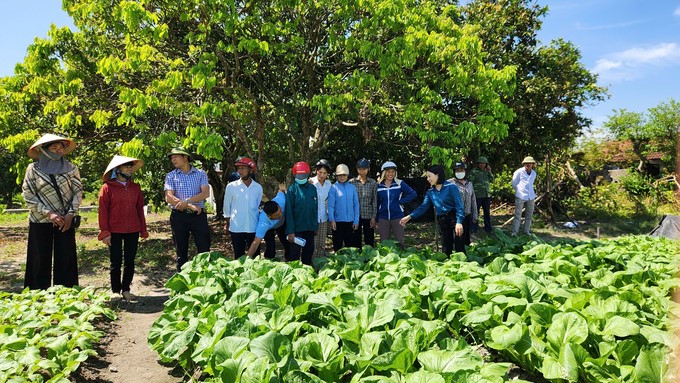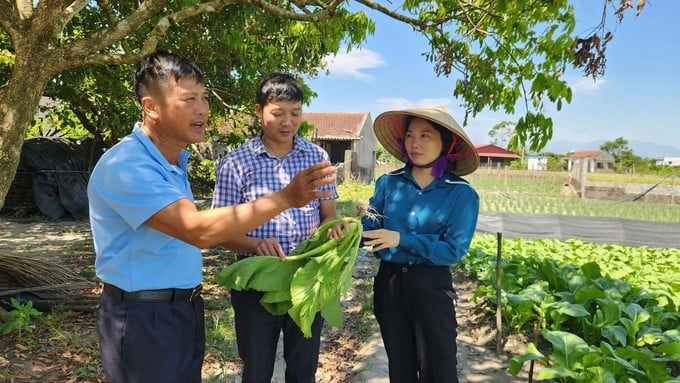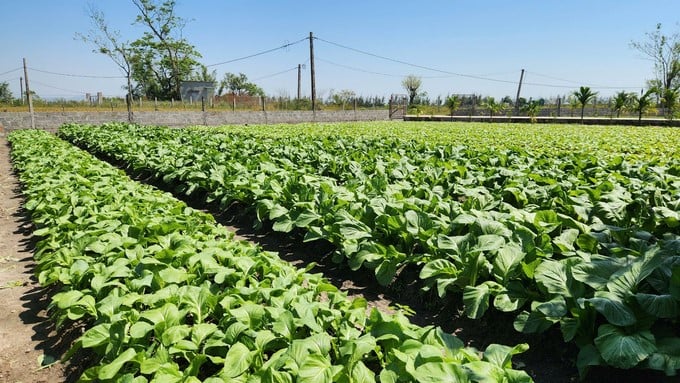June 19, 2025 | 03:30 GMT +7
June 19, 2025 | 03:30 GMT +7
Hotline: 0913.378.918
June 19, 2025 | 03:30 GMT +7
Hotline: 0913.378.918
In recent years, the Integrated Pest Management (IPM) program has been actively applied by farmers in Quang Ninh province, typically in Hai Ha district.
Mr. Le Minh Thang (village 3, Quang Minh commune, Hai Ha district) shared that farmers in the commune previously had the habit of using pesticides to spray vegetables whenever there were pests. However, when using pesticides, not everyone sprays them correctly. Therefore, the vegetables are still disease-infected; the design is not up to par; and the selling price is low.

Farmer students visit the vegetable garden applying IPM in Quang Minh commune (Hai Ha district). Photo: Nguyen Thanh.
To effectively prevent and control pests on vegetables, Quang Minh commune has applied prevention and control measures according to the IPM program. Following the IPM class, growers have applied a combination of measures such as planting and caring for healthy plants; visiting the vegetable garden regularly; farmers becoming experts when they understand pest prevention and control methods; protecting natural enemies, etc., to create safe vegetable products. Thereby contributing to reducing investment costs, reducing the amount of toxic pesticide residues in agricultural products, ensuring food safety and hygiene, stabilizing and balancing the field ecosystem, limiting pollution, protecting the environment, and bringing higher economic efficiency to farmers.
Mr. Le Minh Thang said that the IPM program helps farmers change their way of vegetable production. "We are guided by teachers on applying science and technology and preventing pests at the right time and in the right place, so the vegetables grow well, have better designs, and have higher prices. When the harvest crop comes, traders purchase vegetables right at the garden instead of vegetables being brought to the market to sell like before."
Ms. Nguyen Thi Thuan, Director of the Agricultural Technical Service Center of Hai Ha district, said that in the coming time, the locality will focus on producing, caring for, preventing and controlling pests and diseases on seasonal crops, evaluating seasonal crops in the 2024 season, and deploying the direction of winter crop production to ensure the assigned area and plan.
Along with that, the unit continues to disseminate and mobilize people to implement production models such as winter potatoes, safe vegetables, heat-resistant cauliflower, etc. Apply pest prevention and control measures to plants from the knowledge learned through the IPM program.

Mr. Le Minh Thang in village 3, Quang Minh commune, Hai Ha district (left) applied IPM in vegetable production with an area of nearly 1 hectare, harvesting over 3 tons/year. Photo: Nguyen Thanh.
Besides the vegetable growing area in Quang Minh commune, the IPM program has now been replicated in key agricultural production areas in the province. In 2024, the Quang Ninh Sub-Department of Crop Production and Plant Protection deployed seven classes to train farmers on IPM on rice plants, fruit trees, and vegetables.
Applying IPM helps reduce the number of spraying times on crops by 1–2 times compared to the area not applied, thereby saving costs of buying pesticides and spraying labor (saving money on pesticides and spraying labor from 90,000 to 180,000 VND/acre/crop, equivalent to 2.4–4.9 million VND/ha/crop).
Profits when applying the IPM program compared to people's traditional farming methods increased significantly. To be more specific, profits on rice plants increased by about 4 million VND/ha and vegetables by about 9.3 million VND/ha. Besides, crop productivity increased by an average of 5–10% compared to the area without implementing the IPM program.
In particular, encouraging the use of self-brewed herbal preparations in vegetable production (ginger, garlic, chili, wine) has helped people save on costs, create safe products, and contribute to environmental protection.

The vegetable garden applying IPM yields high productivity and quality and is safe for consumers. Photo: Nguyen Thanh.
Building models of practicing and applying IPM to crops following core farmer training classes has brought economic efficiency. These are models that attract people to learn from experience, serving as a basis for disseminating and replicating the Integrated Pest Management program in the community.
In the coming time, the Quang Ninh Department of Agriculture and Rural Development will continue to coordinate with the Plant Protection Department and the Northern Plant Protection Center to train qualified main teachers to guide farmers in understanding and applying IPM. From there, gradually make Quang Ninh one of the pioneering provinces in the country to effectively implement the IPM program.
In addition to vegetables, applying the IPM program helps the average productivity of ST25 rice in some localities, such as Tien Yen district, Hai Ha district, and Uong Bi city, reach 5.5–6 tons/ha. Rice products are assessed as having delicious quality, and the selling price is 50–70% higher than conventional products.
Translated by Thu Huyen
![Turning wind and rain into action: [9] Digitizing hydrometeorological data in response to climate change](https://t.ex-cdn.com/nongnghiepmoitruong.vn/608w/files/news/2025/06/17/z6704423696987_15fd32ffc26d590d204d520c9dac6786-nongnghiep-165943.jpg)
(VAN) Farmers have begun accessing hydrometeorological applications to adjust their cropping schedules, aiming to ensure productivity and adapt to climate change.
![Turning wind and rain into action: [8] Real-time salinity detection and early warning technology](https://t.ex-cdn.com/nongnghiepmoitruong.vn/608w/files/news/2025/06/17/z6704423696987_15fd32ffc26d590d204d520c9dac6786-nongnghiep-151127.jpg)
(VAN) Thanks to the integration of modern hydrological-hydraulic models, remote sensing technologies, and artificial intelligence, the accuracy of hydrological forecasting has significantly improved.
![Turning wind and rain into action: [7] Early disaster warnings help marine farmers minimize losses](https://t.ex-cdn.com/nongnghiepmoitruong.vn/608w/files/news/2025/06/17/z6704423696987_15fd32ffc26d590d204d520c9dac6786-nongnghiep-142942.jpg)
(VAN) In recent years, thanks to early disaster warnings and forecasting, marine farmers in Khanh Hoa province have been able to reduce risks and losses, thereby improving production efficiency.
![Turning wind and rain into action: [6] ‘Four on-the-spot’ disaster management software](https://t.ex-cdn.com/nongnghiepmoitruong.vn/608w/files/news/2025/06/17/e5a48259d6a262fc3bb3-nongnghiep-183800.jpg)
(VAN) By simply activating the scenario on the disaster management software, the relevant authorities immediately know how many households need to be evacuated, where to evacuate them to, and by what means of transportation…
![Turning wind and rain into action: [5] Hue applies modern technology in disaster forecasting](https://t.ex-cdn.com/nongnghiepmoitruong.vn/608w/files/news/2025/06/17/z6704423696987_15fd32ffc26d590d204d520c9dac6786-nongnghiep-093938.jpg)
(VAN) In Hue city, modern technology has recently been applied in meteorological and hydrological forecasting and warning, helping to reduce the damage caused by natural disasters.

(VAN) A cutting-edge farming technique being implemented on an experimental ranch in Arizona's Sonoran Desert has already saved a billion gallons of water over five years, according to Civil Eats.

(VAN) Poultry and pig production and the environment can be boosted through enhanced water technology, according to new research.